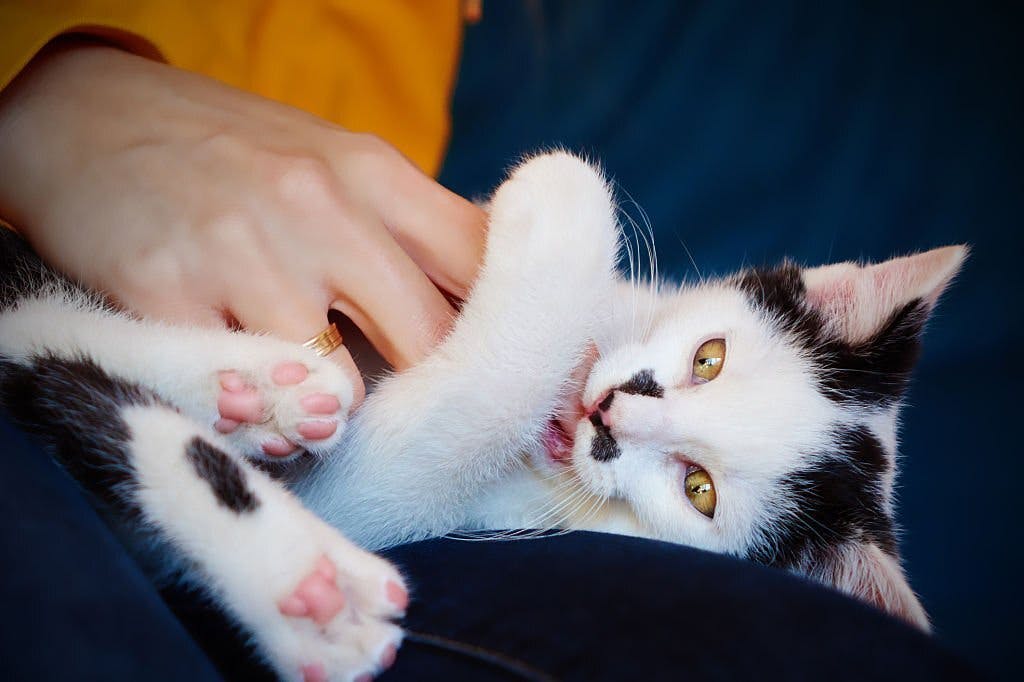If you have a furry feline, it’s a great idea to keep your cat healthy. There are numerous ways you can work to make this more possible. Taking your precious pet to the vet on a routine basis is the first place to start. However, you may find that playing with this animal is vital for the overall well-being of your pet. As an owner of a cat, you may want to know if tickling your pet is a good idea or not.
Do they like it?
The first thing you may do in the morning or when you come home from a long day at work is to play with your feline. Doing this is a great way to start the day and end it for many pet owners.
Keep in mind that each cat has different likes and dislikes so you’ll want to be certain to tickle your pet first to see if you get a good response. If your cat leans in closer to you and wants to be loved tickling could likely be a great idea.
One thing to consider before tickling your feline is if this pet enjoys being touched a great deal. Some cats are much more standoffish than others and prefer to be left alone.
However, certain breeds of cats are much more affectionate than others. If this is the pet type you have it could be ideal to tickle your feline to see how your pet responds.
Positive reactions
Spending time with your feline is likely to be high on your list of things to do every day. However, you want to ensure any interaction you have with your cat is positive for optimal results.
Below are some of the ways your feline may react to being tickled:
Purring – One of the easiest ways you can determine if tickling feels good to your cat is if it begins to purr.
Nudging – Being a cat owner will allow you to see a variety of reactions from your feline. One of the things you may notice frequently when your pet is happy involves nudging you.
Tail wagging – You can rest assured your pet enjoys being tickled if you see a wagging tail. This is just one of the many signs a feline may display when happy.
Following you- There’s little doubt that when your furry feline follows you around that there is a lot of love there. If you find this occurring after tickling your pet, this is a good indication that your cat enjoys this immensely.
Kneading – One of the many ways you can learn if your cat is enjoying the tickling is if it starts kneading up against you. This is a surefire sign that this animal wants to be loved and tickled even more.
Negative reactions
The last thing you’ll want to do is cause your feline any pain or discomfort. This will mean taking good care of your animal and doing the right things each day.
You’ll want to avoid doing anything that your cat may not like and acts negatively to in the process. Listed below are many of the negative reactions common from cats that don’t like being tickled.
Biting – If your pet tries to bite you when being tickled, this reaction could be a negative one. Some cats will do this while not enjoying certain types of activity that may result in your pet feeling bad.
Ear movement – Have you ever noticed when doing something your cat may not approve of the ears will move backward? It’s ideal to avoid tickling your feline if this does occur.
Being vocal – One of the top ways you may find your pet proving dislike of things is by meowing loudly. This is how your feline will typically make you aware of varying situations.
Scratching – The last thing you may want to do is endure a scratch by your beloved pet. However, this is one of the things that will typically happen if you do something that isn’t wanted by your cat.
Misbehaving – Keeping your house in order is something you’ll certainly want to do. The ideal way to do this is to make sure things are kept in place. Cats that aren’t enjoying certain actions may begin to knock over items in your home.
How do they like it the most?
Knowing the method in which your cats will enjoy tickling more is certain to be vital. Your beloved feline may likely enjoy being tickled on the head or the ears.
Gently tickling your cat in these spots could be the best place to start if you wish to show some love and affection. It’s a good idea to begin easily to see how your cat responds to being tickled in this way.
It will be easy to learn if your feline enjoys this activity by seeing either positive or negative reactions. You’ll want to avoid tickling if you see things occurring that indicate your feline dislikes tickling.
On the other hand, if your pet enjoys tickling, you are certain to know this. Your feline will be more loving and just a happier cat in the long run. If this is the case, you’ll want to consider doing this activity for longer periods routinely.
Conclusion
Taking care of your pet will allow you to get the most out of each day. It’s your responsibility as a cat owner to work diligently to keep your cat healthy and happy. Returning the love, you frequently get from your pet is vital for the best relationship possible. Are you ready to get the most from the time spent with this precious pet in your life? If so, tickling your cat could be a good way to stay connected and build a loving relationship. However, you’ll want to be certain that this is an activity your feline enjoys and does not endure for the best responses over time.
